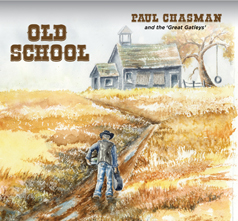Process - May 29, 2001
 Today I talked with an artist friend about some of my columns he had
been reading.
He told me he has always maintained that an artist should not have to talk about
his or her art; that the art should speak for itself and not need explaining. He
said my articles had proven him wrong. To the contrary, I said. I agreed with
him that there is very little an artist can say about his or her art, but
there is a lot we can say about our process.
Today I talked with an artist friend about some of my columns he had
been reading.
He told me he has always maintained that an artist should not have to talk about
his or her art; that the art should speak for itself and not need explaining. He
said my articles had proven him wrong. To the contrary, I said. I agreed with
him that there is very little an artist can say about his or her art, but
there is a lot we can say about our process.
I have been thinking quite a bit about this because I recently wrote some liner notes for my I Hope CD, which I plan to record this month. In the liners, I wanted to talk about all the deep meaning that this music had for me, all the emotional and spiritual layers that the simple statement "I hope" represented. I even thought about writing a poem. Thankfully, I came to my senses! My most basic premise as a musician is that I say things through my music that cannot be expressed in words. Instrumental music allows each listener to receive it personally and individually. If I try to define my music with words, I will then be dictating to my listeners what to hear, robbing them of the freedom to experience the music more purely. If I attempt to verbalize what I have played on my guitar, all I can possibly do is dilute the message, cheapen its value, and narrow its scope.
But I can talk about my process. I can talk about how I got from here to there, what experiences have shaped me, what my struggles are and how I deal with them. I can talk about what I value, what I like and don¹t like, and how my tastes have changed. I can talk about work habits, discipline, time management. I can talk about technique, chord progressions, scales, modulation, time signatures. I can talk about every mechanical, emotional, cognitive, and spiritual aspect of music, but I there is nothing I can say about my music that the music won¹t say better!
I suppose I am not completely consistent in my conviction that words shouldn¹t interfere with instrumental music. After all, I don¹t use titles like Allegro in Bb minor, opus 47. My new CD has tunes titled I Hope and Grace and The Powers that Be. My last CD, Songs from the Bay, had a tune called Dog Dance (Sitka and Clyde), and in the liners I told quite a lengthy story about my two dogs and how they play together. So my music is about something. I often begin to compose a piece without knowing what the subject is. Only later, as the music unfolds, do the images emerge and reveal to me the picture I am painting. Other times I begin with a specific story in mind, and I write music to tell that story. I then give the tune a title which simply suggests the theme, giving the listener a hint of a direction, but still allowing for a broad range of individual interpretation.
I love to hear other artists talk about their process. I am fascinated to hear Leonard Bernstein talk eloquently about composing, or to read about Van Gogh and his struggles, or to hear my friend Scotty talk about his masterful woodworking. I get more insight into their art and my own. I identify with every artist to a greater or lesser degree, and in hearing their stories, I am able to sort out which aspects of the artistic process are universal, which parts I share with many and which are uniquely my own. I can only hope that if it is useful to me, then it also may be useful to other artists to hear some of the things that I think about as I am attempting to create something new.

